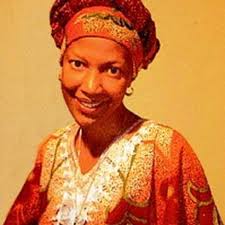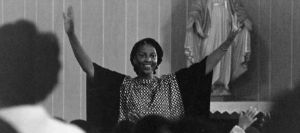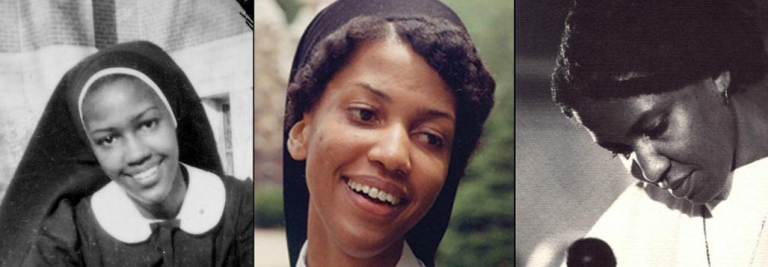February is Black History Month and throughout the month OLMC will feature stories from the rich tradition, and at times hidden history, of Black Catholics in the United States and around the world.
A self-proclaimed, “old folks child,” Thea Bowman, named at birth, Bertha Elizabeth Bowman, the daughter of middle-aged parents, Dr. Theon Bowman, a physician and Mary Esther Bowman, a teacher. She was born in 1937 and reared in Canton, Mississippi. As a child she converted to Catholicism by the influence of the Franciscan Sisters of Perpetual Adoration and the Missionary Servants of the Most Holy Trinity who were her teachers and nurtured her faith. Growing up, Thea listened and learned from the wit and wisdom of the elders. Ever precocious, she would ask questions and seek new insights on how her elders lived, thrived and survived. She learned from family members and those in the community coping mechanisms and survival skills. She was exposed to the richness of the African-American culture: the history, the stories, the music, the songs,the rituals, the prayers, the symbols, the foods,the customs and traditions. Moreover, she was cognizant that God was indeed the God of the poor and oppressed. Her community instructed her, “If you get, give—if you learn, teach.” She developed a deep and abiding love and faith in a God who would make “a way out of no way!”
 For Thea Bowman, the decision to convert to Catholicism was rooted in what she witnessed: she was drawn to the Catholic Church but by the example of how Catholics seemed to love and care for one another, most especially the poor and needy. For Theareligion was real and relevant: people put their faith into action. In 1953 at the age of fifteen she told her family and friends she wanted to join the Franciscan Sisters of Perpetual Adoration and left the familiar Mississippi terrain to venture off to the unfamiliar town of LaCrosse, Wisconsin where she would be the only African-American member in the convent.
For Thea Bowman, the decision to convert to Catholicism was rooted in what she witnessed: she was drawn to the Catholic Church but by the example of how Catholics seemed to love and care for one another, most especially the poor and needy. For Theareligion was real and relevant: people put their faith into action. In 1953 at the age of fifteen she told her family and friends she wanted to join the Franciscan Sisters of Perpetual Adoration and left the familiar Mississippi terrain to venture off to the unfamiliar town of LaCrosse, Wisconsin where she would be the only African-American member in the convent.As a Sister, she was given the name, “Sister Mary Thea” in honor of the Blessed Mother and her father, Theon.” Her religious name, Thea, literally means “God.” She was trained to become a teacher. She taught at all grade levels, eventually earning her doctorate and becoming a college professor. The turbulent 1960s was a period of transformation in a nation torn by racial strife and division. The country was confronted by the quest for justice and racial equality for all Americans. The late 1960’s was also a time of transformation for Sister Thea Bowman: both a spiritual and cultural awakening. The liturgical renewal of the Second Vatican Council encouraged Sister Thea to rediscover her African-American religious heritage and spirituality and to enter her beloved Church fully functioning. She emphasized that cultural awareness had, as a prerequisite, intentional mutuality. Eager to learn from other cultures, but she also wanted to share the abundance of her African-American culture and spirituality.
Indeed, Sister Thea became a highly acclaimed evangelizer, teacher, writer, and singer sharing the joy of the Gospel and her rich culture throughout the nation and world: wherever she was invited to share the Good News.
In 1978, spurred by the need to return home to Canton to care for her aging parents, Sister Thea accepted an appointment to direct the Office of Intercultural Affairs for the Diocese of Jackson. In this position Sister Thea continued to assail racial prejudice and promote cultural awareness and sensitivity. A few years later in 1984, Sister Thea was faced with devastating challenges: both her parents died and she was diagnosed with breast cancer. Her friends and students encouraged her to choose life. Sister Thea vowed to “live until I die” and continued her rigorous schedule of speaking engagements. Even when it became increasingly painful and difficult as the cancer moved to her bones, she would not stop witnessing and sharing the joy of the Gospel of Jesus Christ.

Donned in her customary African grab Sister Thea would arrive in a wheel chair with no hair (due to the chemotherapy treatments) but always with her big bright eyes and pleasant smile. She did not let her wheel chair or the deterioration of her body keep her from one notable and unprecedented event –an opportunity to address the U.S. Bishops at their annual June meeting held in 1989 at Seton Hall University in South Orange, NJ. Sister Thea spoke to the bishops as a sister having a “heart to heart” conversation with her brothers. This well crafted, yet at times quite spontaneous message spoke of the Church as her “home,” as her “family of families” and her trying to find her way “home.” She told them the “true truth” about what it meant to be Black and Catholic. She instructed and enlightened the bishops on Black history and spirituality. She challenged the bishops to continue to evangelize the Black community, to promote inclusivity and full participation of Blacks within Church leadership, and to understand the necessity and value of Catholic Schools in the Black community. And when she was through she urged the bishops to move together, cross arms and sing with her, “We Shall Overcome.” She seemingly touched the hearts of the bishops as evidenced by their thunderous applause and tears flowing from their eyes.
When asked by her dear friend and homilist for her funeral, Father John Ford, S.T. what to say at her funeral, Sister Thea answered: “Tell them what Sojourner Truth said about her eventual dying, ‘I’m not going to die. I’m going home like a shooting star.’” And so she did, at five o’clock in the morning of March 30, 1990 in the home where she grew up in Canton, MS.
Sister Thea said that she wanted inscribed on her tombstone the simple, yet profound words: “She tried.” “I want people to remember that I tried to love the Lord and that I tried to love them…”



